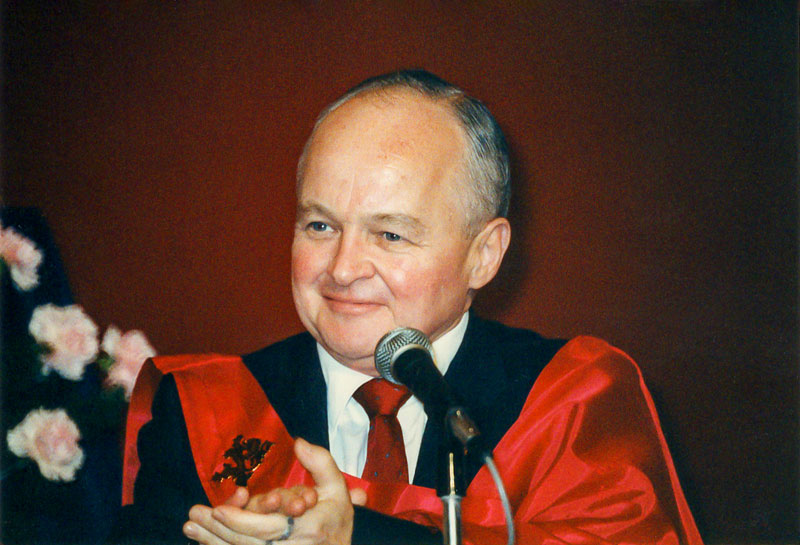In Memoriam John Russell Spann: “A Just Man”
August 15, 1931 — July 28, 2019
Members of the American Society for the Defense of Tradition, Family, and Property (TFP), and its twenty-eight sister associations throughout the world mourn the passing of John Russell Spann on July 28, 2019. He will be remembered as a man with boundless enthusiasm for the traditional Magisterium of Holy Mother Church. He devoted over fifty years of his life in zealous dedication to the Counter-Revolutionary cause in defense of Christian civilization.
It was fitting that Mr. Spann, an ardent devotee to Our Lady, was born on the feast of her Assumption, August 15, 1931, in Morristown, New Jersey. He was the fourth of eight children born to Paul Joseph and Josephine Eble Spann.
When still very young, the family moved to Far Hills, N.J. where they purchased a 170-acre dairy farm. Mr. Spann would often recount those days of milking his favorite Jersey cows by hand. He never failed to marvel at a nice herd of cattle grazing in the fields.
His sister Josephine recalled her brother being a voracious reader and a talkative little boy. A humorous anecdote reveals both these qualities. When nine years old, John contracted scarlet fever and had to be completely isolated. Only his aunt, who cared for all his needs, could enter the room. The other children were forbidden to approach him. One day, his mother peeped her head in the room and was horrified by what she saw. There sat her sick son, reading a book to his brothers and sisters who listened attentively as they crowded around their contagious brother on his bed.
From an early age, John also displayed an aptitude for languages. He studied Spanish at Bernard’s High School in Bernardsville, N.J. under Mrs. Bouton. During an interview with the author days before his death, he admitted being bored in the beginning because of the “nonsense” of repeating simple phrases.
“I was not interested in learning little words,” he said. One day, Mrs. Bouton brought a Spanish newspaper clipping to be translated.
“Now this was interesting,” Mr. Spann explained. With his rudimentary knowledge of the language, he translated the entire article and later earned an A in the class. This new-found skill became a useful tool he later would place at the service of the Church and Christian civilization.
Facing Progressivism and Homosexuality
After high school, he studied at St. Vincent’s College in Latrobe, Penn. where he graduated with a B.A. in philosophy. He then felt he might have a vocation for the priesthood. He thus attended the Benedictine Seminary at St. Vincent’s and made his minor vows although clearly unhappy with the community’s modernist ways already in the forties. From there, he went to the Abbey of Gethsemani in Trappist, Ky., but was sent home by his superiors. His parents were told that “John did not adjust well to their seminary life.” In fact, Mr. Spann had witnessed homosexual activity among the seminarians. When he reported the scandalous behavior to his superiors, he was silenced.
Disillusioned by his religious life experiences, he entered the Army at age twenty-one. During his two years as a soldier, he served at Fort Gordon in Augusta, Ga. before being transferred to the Department of Defense Language School in Monterrey, Calif. where he learned Mandarin Chinese. There he met Karol Klauer whom he would later marry. They had four sons before she divorced him against his wishes. He tried in vain to convince her to remain faithful to their marital vows but was unsuccessful. Mr. Spann stayed true to Catholic teaching and observed chastity the rest of his life.
After his service in the Army, Mr. Spann earned a Master Degree in Languages (with emphasis on Chinese), at St. John’s University in Long Island, N.Y.
Upon failing to secure a teaching job, he briefly worked for his older brother Max selling milk door to door in New Jersey. By the end of the sixties, however, he was back in Monterey, where he would develop a friendship that would change his life.
“Clippings Meetings” in a Garage
Upon arriving, he had a variety of jobs including wiping down automobiles at a car wash. Despite his level of education, he boasted of having no problem doing such menial work because he detested the socialist welfare system. “I would rather eat canned beans,” he said, “than take one penny from the government.”
During his time in California, he made friends with Jack and Joan Amader. Jack owned a car windshield repair business with flexible hours that facilitated hours of meaningful conversation between the two men. Mr. Spann humorously described how he would grab a six-pack of cold beer and some potato chips after he got off work and go to Jack’s business. When Joan saw him from a distance, she would pull down the shade of the store window which indicated they were closed for business.
He would then join Jack as Joan read newspaper articles Jack had underlined since their last session. They would then analyze world events over beer and chips.
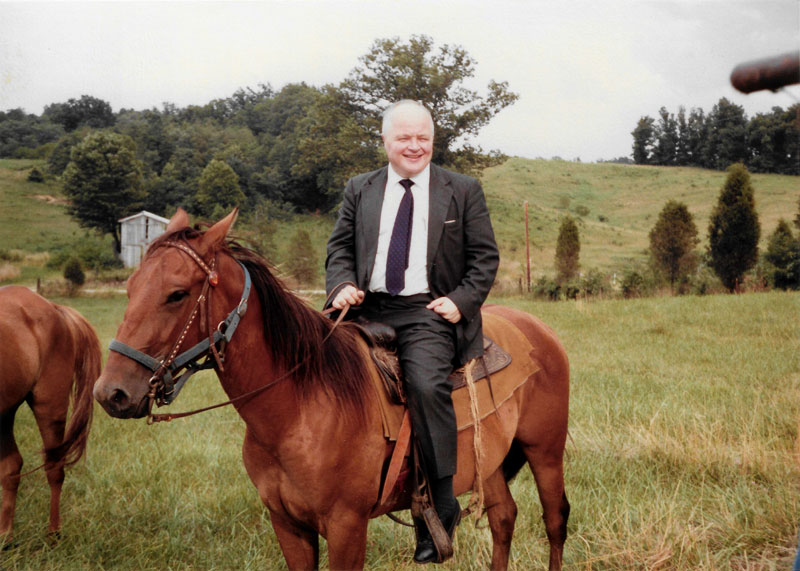
Mr. Spann explained how Jack’s psychological perception, coupled with his own knowledge of history and Church doctrine, led them to some very interesting conclusions. Unbeknownst to either of them, this methodology was similar to that used by Prof. Plinio Corrêa de Oliveira in the weekly “Clippings Meeting” held in São Paulo, Brazil. Without realizing it, Mr. Spann was following a path which would lead to his meeting with the founder of the TFP movement.
Both men knew about the prophecies of Our Lady of Fatima, especially the chastisement she foretold if mankind did not convert. As they followed the course of events, they were disturbed with the state of the world, especially in California. They saw the hippy movement, Black Panthers, race riots and profound changes within the bosom of Holy Mother Church. They asked themselves if these things were not the beginning of the end.
During the abovementioned interview, Mr. Spann recalled how the world scenario unfolding before their eyes was not much different from the barbarian and Muslim invasions in the early Middle Ages. However, he noticed something key was missing. “There was no new Charlemagne to guide mankind,” he said.
John and Jack concluded that a solution must come from South America since they had heard of a resurgence of the Catholic faith there. They pooled their funds and purchased a ticket for Mr. Spann’s trip to Argentina.
“I Felt Like Prostrating on the Ground”
Forty-eight hours after arriving in Buenos Aires in the summer of 1968, Mr. Spann came upon a scene, about which he never tired of telling others. He was walking down a street when he heard the shouts of young men off in the distance. He looked up and saw the ruby red standard of the TFP emblazoned with the golden lion, fluttering in the wind. The young TFP members were shouting out slogans to attract the public and inform them of the subject of their campaign.
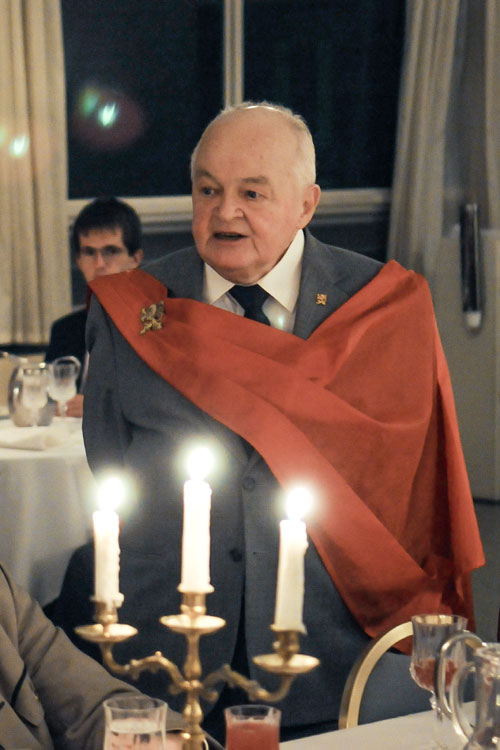
Seeing such a marvelous sight, he exclaimed, “Oh, if only I had not sinned.” He was so overwhelmed by what he saw he added, “I felt like prostrating on the ground.”
One Argentine TFP member, Dr. Miguel Beccar Varela, describes seeing this American anxiously approach. He figured he was just another tourist and told Mr. Spann to wait in a nearby coffee shop if he wished to talk more after the campaign. Everyone was surprised several hours later to see him waiting patiently to speak with them. They then realized that he was someone serious.
During that post-campaign conversation, he learned that the Argentine TFP was gathering signatures for a petition to Pope Paul VI, respectfully asking His Holiness to take efficacious measures against leftist infiltration in the Catholic Church. It was part of a larger campaign by TFPs in Brazil, Uruguay, and Chile that would eventually garner 2,038,112 signatures.
Mr. Spann could hardly contain his enthusiasm for what he saw. He started attending lectures at the Argentine TFP center about the book, Revolution and Counter-Revolution, by Prof. Plinio Corrêa de Oliveira.
“I took seventeen pages of notes,” he recalled, “and when it was over, I exclaimed, ‘This [book] is very important, and it must be translated into English.’” So it was that the bedside book, the virtual “battle manual” for counter-revolutionaries, was eventually made available to English readers all over the world.
“I Felt He Was the Man of the Age!”
News of this enthusiastic American reached the ears of Prof. Plinio Corrêa de Oliveira, who arranged for him to be invited to visit Brazil in the summer of 1969. Mr. Spann had already grasped the caliber of the Brazilian TFP’s founder through studying his masterwork and felt overwhelmed and unworthy of such an honor.
When told in Brazil that he was going to meet Dr. Plinio, he said, “I… meet Dr. Plinio? I’ve seen enough; I know that he and the TFP are true.” An accompanying TFP member ignored his reticence and took Mr. Spann to meet the TFP founder, who was giving a symposium to younger members.
Upon meeting him, Mr. Spann recounted, “I was awed! I felt he was the man of the age, and I wanted to serve him. Even if this meant washing the dishes or serving his meals, I would feel myself in heaven.” This desire would not surprise anyone who had the pleasure of meeting Prof. Plinio Corrêa de Oliveira.
Passionate Love of Souls Was the Secret of His Apostolic Success
He would eventually return to the United States in the early seventies and became a founding member of the American TFP. He served on its Board of Directors and as president for many years. He held various positions, including speaker, teacher, author, and translator.
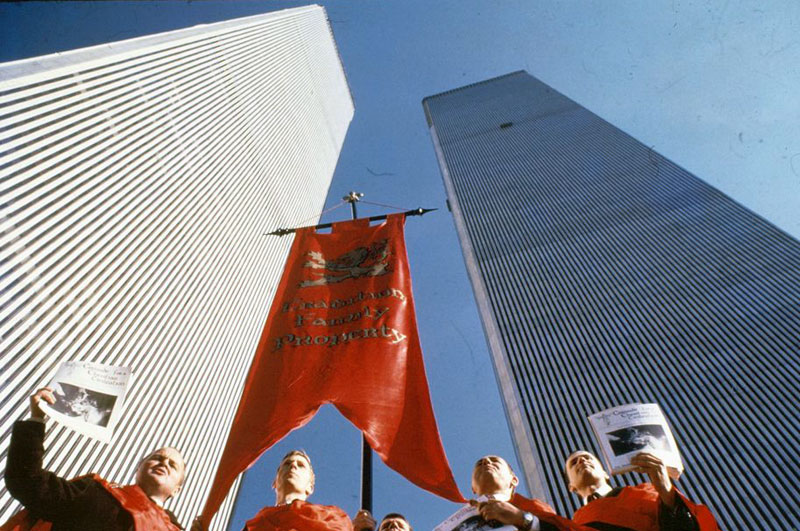
Mr. John Spann is the first on the left.
Over the next decades, Mr. Spann was a regular speaker at TFP national and regional conferences and frequently gave talks for small nuclei of supporters and sympathizers throughout the country. He was a trailblazer who traveled America’s highways and byways contacting friends or subscribers to the Crusade for a Christian Civilization magazine who would inevitably introduce him to their family members and friends. He had an impact on all he met. There was hardly a state where he did not leave his unmistakable thumbprint.
The secret of his success was his intense love of souls. Like the TFP founder, he wanted to understand souls as a means of understanding something of their Creator. However, this can only happen if one really gets to know the other person. This is what attracted people most to Mr. Spann.
They knew he was interested in them and cared intensely for the good of their immortal souls. On numerous occasions, he would stay up until the wee hours of the morning talking. Sometimes these nocturnal conversations were so blessed that they only ended with the rising sun.
A humorous case of the power of his attraction was a visit to a couple in Bakersfield, Calif. Mr. Spann rang their doorbell, looking for the former owners. The new owners, however, were so intrigued by him that they invited him in. He ended up lodging with them while contacting others in the area.
Mr. Spann traveled extensively abroad to numerous countries in South America. His love for the Orient would eventually take him to the faraway Philippines, helping to lay the foundation for the current Filipino TFP. After his death, the American TFP received numerous condolences from people around the world who were beneficiaries of Mr. Spann’s unbounded kindness and affectionate attention. The sister of a Brazilian TFP member wept profoundly.
Apostle of the Miraculous Medal
During his last years, Mr. Spann’s health did not permit him to do what he would have liked for the counter-revolutionary cause. This did not stop him from dreaming. As his eightieth birthday approached, he planned a trip to Taiwan—by ship—in the hopes of reaching Chinese-speaking people with the counter-revolutionary message. While such an undertaking was impossible, younger TFP members could not help but admire his fervor and willingness to sacrifice himself for the cause.
He eventually consigned himself to a life of mentoring younger TFP members and language courses for anyone who desired. However, he never stopped his endeavors to spread the Faith, especially the distribution of the Miraculous Medal. He could always be found with a handful of medals in his pocket, giving them to everyone he met, Catholics and non-Catholics alike.
Eleven Floors Up… And One Miraculous Medal
He always gave the recipients an explanation of the medal’s historical significance which left them dumbfounded. One humorous encounter was captured on camera by Peter Shibler, his faithful assistant, dedicated friend, and fellow TFP member. The two of them were having coffee in a Dunkin Donut shop, a month before he died. Peter left for a brief moment, and upon returning, he witnessed something he had seen so many times before. He captured the moment with a photo showing Mr. Spann with his hand extended as he explains and gives the Miraculous Medal to a stunned employee.
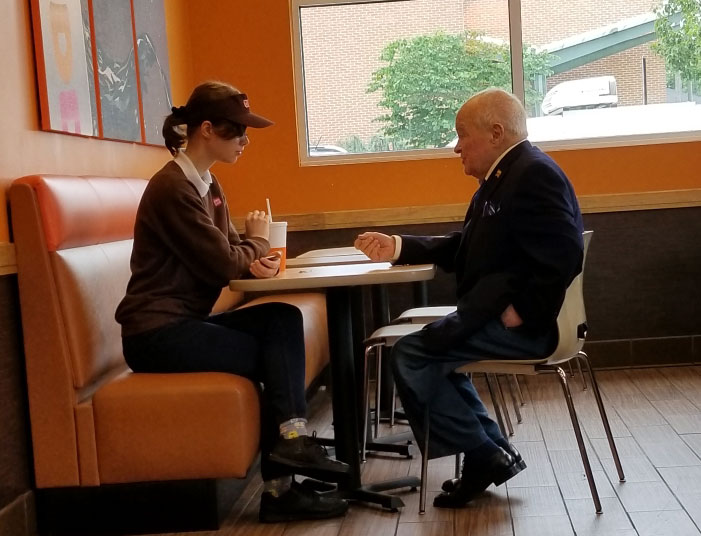
The Final Moments
His many labors, health problems, and open heart surgeries took their toll on Mr. Spann’s body. While his TFP brothers often commented on his almost miraculous longevity, they all knew that one day he would die.
The first death knell came on Saturday, July 20, when his heart went out of rhythm. If not for his defibrillator, doctors said he would have died. A second such episode occurred in the afternoon of the following Tuesday. His condition was so serious that his doctors requested the following morning that he be taken directly to Hershey Medical Center in Hershey, Penn. This is where Mr. Spann would go through his own Calvary.
In the following days, he would leave his mark on those he met. Several doctors and nurses made favorable comments about him and his vast knowledge. Like thousands before them, they were deeply impressed. His male nurse, Jack, went out of his way to provide thoughtful assistance to the numerous TFP members who came to visit.
On Thursday, July 25, Fr. Modestus Ngwu, O.P., from nearby St. Joan of Arc Church, visited Mr. Spann. The priest recounted how they had an hour-long conversation together. The following day, Mr. Spann asked him to shut the door.
“I am going to have a stent inserted today,” he explained, “and it only has a 50/50 chance of working, so I want to go to confession.” Fr. Modestus heard his confession and gave him Holy Communion. He later told TFP members that Mr. Spann was, “one of the most devout Catholics he had ever met and that he received the sacrament with more reverence than most people he visits.”
Fr. Modestus returned on Saturday, and Mr. Spann received Our Lord for the last time. On Sunday morning, his health deteriorated rapidly. Fr. Modestus visited a final time to provide last rites and an apostolic blessing.
As his final agony approached, his brothers and sisters arrived as those in the small room swelled to nearly twenty people. Mr. Spann’s breathing was strong, but the time between breaths began to increase steadily. Those present prayed the rosary followed by numerous hymns, including the Confiteor, Ave Maria and, most importantly, the Credo. Some who were present recalled a palpable calm settling over the room as the life of Mr. Spann was now being measured by the number of breaths he still had before he gave up his soul.
Periodically, his nurse Jack would enter the room and simply stand there, imbibing the serene yet somber atmosphere. A female nurse adjusted Mr. Spann’s pillow and became visibly emotional with tears welling up in her eyes. Unlike the others in the room, neither of them knew this man, but they came to understand that someone of value was about to pass from this valley of tears.
After the prayers for the dying, TFP members sang one last hymn, the Salve Regina, sublime et ancienne. It was one of Mr. Spann’s favorites. As the hymn’s melody began, Mr. Spann took one last breath and was gone. It was 5:52 pm.
Addendum
In closing, this narration was not meant to be a canonization of John Russell Spann. He would not want people praying to him but rather for the eternal repose of his immortal soul. More than anything, the author desired to provide the history of a man who touched many lives. This article highlights some of his qualities and leaves everything that was lacking to Our Merciful Savior.
Nevertheless, every man has an unum, a single defining characteristic, and so did Mr. Spann. The facts above might perhaps help understand better a comment about him made by Prof. Plinio Corrêa de Oliveira.
A Brazilian TFP member, Mr. Helio Viana, recalled a lengthy conversation between Mr. Spann and the TFP founder during one of his many visits to South America. Dr. Plinio’s next conversation was with Mr. Viana, and he started it by saying, “Spann is a just man!”
Updated August 8, 2019.


